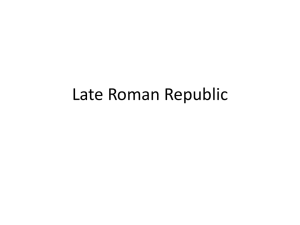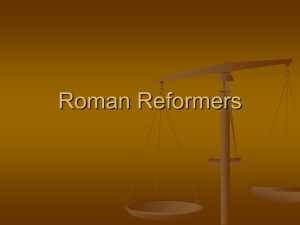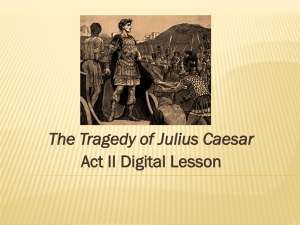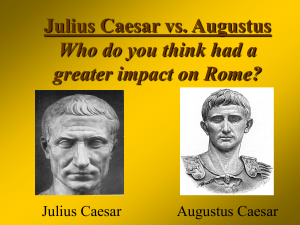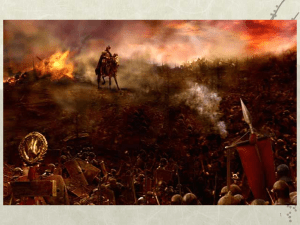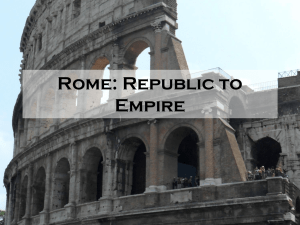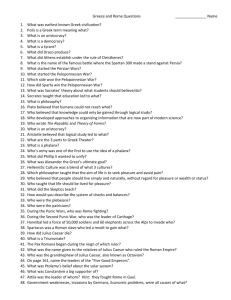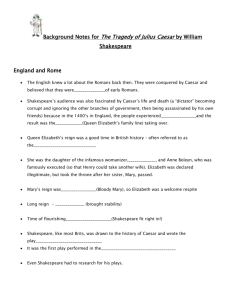Caesar
advertisement
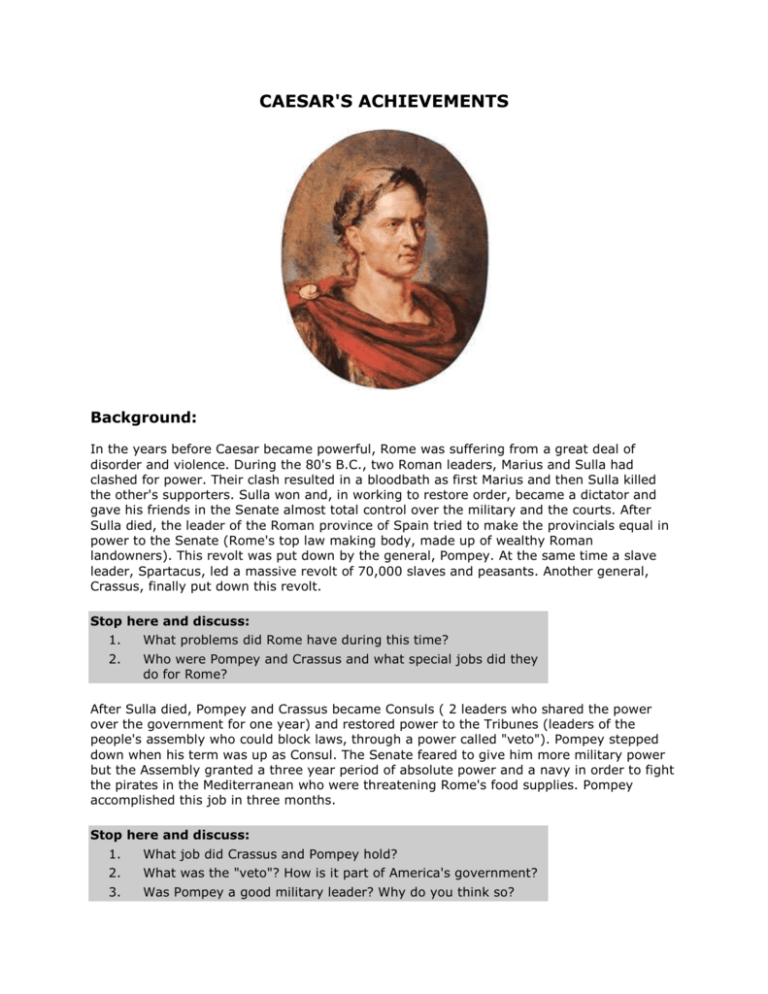
CAESAR'S ACHIEVEMENTS Background: In the years before Caesar became powerful, Rome was suffering from a great deal of disorder and violence. During the 80's B.C., two Roman leaders, Marius and Sulla had clashed for power. Their clash resulted in a bloodbath as first Marius and then Sulla killed the other's supporters. Sulla won and, in working to restore order, became a dictator and gave his friends in the Senate almost total control over the military and the courts. After Sulla died, the leader of the Roman province of Spain tried to make the provincials equal in power to the Senate (Rome's top law making body, made up of wealthy Roman landowners). This revolt was put down by the general, Pompey. At the same time a slave leader, Spartacus, led a massive revolt of 70,000 slaves and peasants. Another general, Crassus, finally put down this revolt. Stop here and discuss: 1. What problems did Rome have during this time? 2. Who were Pompey and Crassus and what special jobs did they do for Rome? After Sulla died, Pompey and Crassus became Consuls ( 2 leaders who shared the power over the government for one year) and restored power to the Tribunes (leaders of the people's assembly who could block laws, through a power called "veto"). Pompey stepped down when his term was up as Consul. The Senate feared to give him more military power but the Assembly granted a three year period of absolute power and a navy in order to fight the pirates in the Mediterranean who were threatening Rome's food supplies. Pompey accomplished this job in three months. Stop here and discuss: 1. What job did Crassus and Pompey hold? 2. What was the "veto"? How is it part of America's government? 3. Was Pompey a good military leader? Why do you think so? The Assembly forced the Senate to give Pompey command against the Mithridates who had again conquered Asia Minor and Greece, both important parts of Rome's empire. Pompey not only defeated the Mithridates, but brought all of the Middle East to the Euphrates River under Roman control or alliance. While Pompey was away, a rebellion, led by a man named Catiline, plunged Rome into civil war. When Pompey returned he disbanded his army outside of Rome and came back to the city as a private citizen. The Senate, thinking to avoid another dictatorship like Sulla's, refused to grant his Pompey's veterans any land or to recognize his military triumphs in the East. As one can see, Rome of the 60's B.C. was marked by disorder among the common people, angry soldiers who had not been given what they considered their lust rewards for fighting and a Senate which looked back to a period of dictatorship under Sulla. Stop here and discuss: 1. Why do you think the Roman Senate was afraid of Pompey? 2. What was Rome like in the 60's B.C.? First Triumvirate: While Pompey was in the East, Crassus, the general who had put down the slave revolt and who was also a very wealthy Senator, tried to increase his power at home by working with a man named Julius Caesar. Caesar was very popular with the people because his family had for many years supported democratic causes and as magistrate he had lavished money on public games and works project which employed common people. To get control of Rome, the three men, Pompey (who brought soldiers and prestige), Crassus (who brought wealth), and Caesar (who brought influence over the common people) formed an alliance called the First Triumvirate. The men wanted to restore Rome's security by distributing choice offices and military commands to their friends and supporters. Caesar was given command of Gaul (what is now France and Germany) and Crassus was given command of the army in Parthia (modern Iran and Pakistan) and Pompey was given recognition for conquering the Mithridates and stayed at home in Rome. Stop here and discuss: 1. When Crassus, Caesar, and Pompey joined together, what strengths did each of them have? 2. Which was the most important of these strengths? Why? After Crassus died in battle, competition for power between Caesar and Pompey became open conflict. Caesar was a brilliant commander and led his soldiers to many victories against the Germans. He added all the lands west of the Rhine River to the territory of Rome, including Britain. He wrote about these battles in popular diaries called "Commentaries," which were great propaganda pieces to show to the people what a good soldier he was. Caesar also dealt well with the Gauls. He treated them leniently and his good sense made them trust him and remain loyal. The soldiers and the people loved him and wanted Pompey overthrown and Caesar to be their leader. Stop here and discuss: 1. How did Caesar increase his power? 2. Did Caesar do anything wrong in gaining power? Why do you think so? Meanwhile, The Senate, though fearful of Pompey, became more fearful of Caesar because of his tremendous popular appeal. Caesar now also had a strong and loyal army behind him. Caesar sought to gain the Consulship while he was still in Gaul in 48 B.C. The Senate declared him a public enemy and told him to disband his army. Caesar said he would do so if Pompey did the same. When Pompey refused, Caesar marched with his army toward Rome. His illegal action started another civil war. Caesar fought Pompey's followers in Spain and then in Greece. Pompey fled to Egypt and was killed by an agent of the king. Caesar went to Egypt and fell in love with the king's sister, Cleopatra. Stop here and discuss: 1. Why do you think the Senate declared Caesar a public enemy? 2. How do you think Rome's experience with Sulla and Marius affected their reaction to the struggle between Caesar and Pompey? 3. Was Caesar right or wrong to have entered Rome with his army? Why? Caesar's Rule: Caesar returned to Rome as its master, his authority having surpassed that of the Senate. He became king in all but name. He had his name stamped on coins, had his statue put in the temple and wore royal purple. He took power from the Senate and made the magistrates his appointees. But, he did not punish his enemies in the government by sending them from Rome as most earlier leaders had done. He enacted many reforms to improve the economy. He limited the grain dole to those actually in need so that the capital city would not continue as a magnet for idle mobs. He established Roman colonies by giving land to the soldiers and landless peasants in Carthage and Corinth. He made a law which limited the number of slaves estates could employ so that the poor free people would have more work. In the provinces (land conquered by Rome) he appointed new governors and made them strictly accountable so they would no longer simply plunder the people of all their wealth. He reduced taxes and made collections more fair. He allowed the people in Sicily, Spain and Gaul to become Roman citizens so they could participate in the central government as well as their local governments. Stop here and discuss: 1. What reforms did Caesar make which helped the poor? 2. What reforms did Caesar begin to make in the provinces? Were they good or bad for Rome? Why? 3. How did Caesar increase his power? Caesar's Death: Caesar did not remain in power long enough to complete his reforms. He had intended to codify the laws, improve money coinage, make a census of Rome, and reform the calendar. He only achieved the last major change. Many Senators feared that if Caesar's power continued, the republican government would never be restored and Caesar would hand down his leadership to an heir. Sixty Senators plotted to kill him. He was warned of the conspiracy, but Caesar chose to ignore it. On March 15, the Ides of March, in 44 B.C., he entered the Senate unarmed. He was surrounded by conspirators and stabbed 23 times. After the death of Caesar, Rome again fell into chaos. Stop here and discuss: 1. Why do you think Caesar ignored the warning about the conspiracy? 2. Was the death of Caesar good or bad for Rome? Why?
